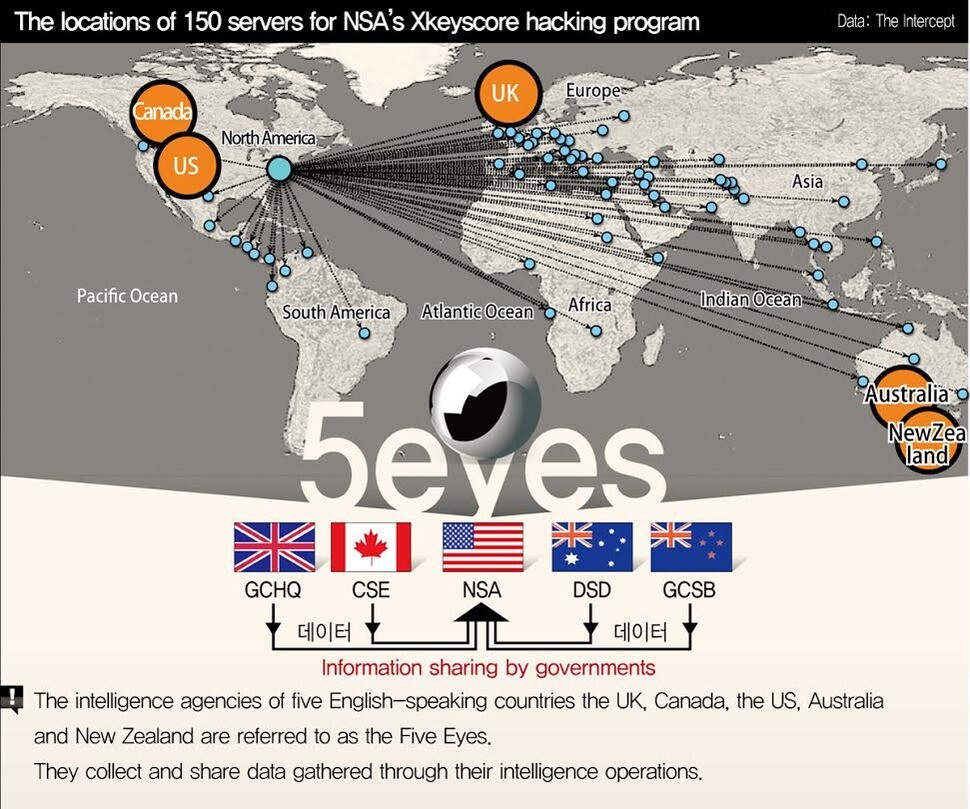hankyoreh
Links to other country sites 다른 나라 사이트 링크
S. Korean President may have been monitored on 2009 visit to UK

News that South Korea had been the subject of monitoring by the so-called “Five Eyes,” an intelligence group representing five Anglophone nations, first broke in 2013-14 with revelations by former US National Security Agency (NSA) contractor Edward Snowden. The nature of the monitoring and the South Korean response remain unclear, however.
A case of monitoring in 2009 by British intelligence provides an example. In June 2013, the Guardian newspaper reported that Britain’s Government Communications Headquarters (GCHQ) had intercepted emails, telephone calls, and computer access records for world leaders and other delegates during the April 2009 G20 summit in London. While the document contained no specific reference to South Korea, it did refer to “diplomatic targets from all nations,” suggesting that South Korean attendees were also among those monitored. Another document surfaced showing that GCHQ was capable of accessing text message servers and customer information for key telecommunications providers in Britain. Yet another document mentioned that GCHQ used a program code-named “Royal Concierge” to examine sigint (signals intelligence) activity at hotels where monitoring targets were staying, providing more circumstantial evidence of monitoring of world leaders.
In a telephone interview with the Hankyoreh, a former senior official who attended the summit said the Ministry of Foreign Affairs “distributed local phones to all members of the delegation.”
“The President [Lee Myung-bak] used his own exclusive cell phone, but there were times he used one of the delegation members’ [phones] if he had urgent business,” the former official added.
The source went on to say that there had been no attempts by the current administration to contact them since the Snowden revelations.
Former Presidential Security Service chief Kim In-jong, who was responsible for guarding Lee during the event, told the Hankyoreh in a recent telephone interview that he was “not really aware” of the Snowden incident.
“The PSS director is in only in charge of physical security, not communications security,” Kim said.
Kim also said he had not been contacted by the current administration. He did not respond when asked for a list of delegation members and security duties, citing regulations against their divulgence.
Evidence that the NSA monitored several dozen sites connected with embassies and UN missions for 17 countries in 2010 also surfaced in an internal document titled “Close Access SIGADs.” SIGAD is an acronym for “sigint activity detector.”
When asked about the administration’s response to the document’s discovery, the South Korean Ministry of Foreign Affairs said it had “expressed deep concerns to the US about the allegations that South Korea had been monitored, and made a request through diplomatic channels [for them] to provide a suitable explanation and measures.”
The ministry said it could “not comment in detail” on the US‘s explanation, but added that President Barack Obama had “stated in a January 2014 address that [the US] would not be monitoring communications of heads of state and administrations in allied nations unless there were strong security reasons.”
When asked about its response to the evidence of British online monitoring, the ministry said it was “not aware of anything.” The ministry also declined to disclose the name of the person in charge of communications security at the time.
By Ko Na-mu and Choi Hyun-june, staff reporters
Please direct questions or comments to [english@hani.co.kr]

Editorial・opinion
![[Column] Park Geun-hye déjà vu in Yoon Suk-yeol [Column] Park Geun-hye déjà vu in Yoon Suk-yeol](https://flexible.img.hani.co.kr/flexible/normal/500/300/imgdb/original/2024/0424/651713945113788.jpg) [Column] Park Geun-hye déjà vu in Yoon Suk-yeol
[Column] Park Geun-hye déjà vu in Yoon Suk-yeol![[Editorial] New weight of N. Korea’s nuclear threats makes dialogue all the more urgent [Editorial] New weight of N. Korea’s nuclear threats makes dialogue all the more urgent](https://flexible.img.hani.co.kr/flexible/normal/500/300/imgdb/original/2024/0424/7317139454662664.jpg) [Editorial] New weight of N. Korea’s nuclear threats makes dialogue all the more urgent
[Editorial] New weight of N. Korea’s nuclear threats makes dialogue all the more urgent- [Guest essay] The real reason Korea’s new right wants to dub Rhee a founding father
- [Column] ‘Choson’: Is it time we start referring to N. Korea in its own terms?
- [Editorial] Japan’s rewriting of history with Korea has gone too far
- [Column] The president’s questionable capacity for dialogue
- [Column] Are chaebol firms just pizza pies for families to divvy up as they please?
- [Column] Has Korea, too, crossed the Rubicon on China?
- [Correspondent’s column] In Japan’s alliance with US, echoes of its past alliances with UK
- [Editorial] Does Yoon think the Korean public is wrong?
Most viewed articles
- 1[Column] Park Geun-hye déjà vu in Yoon Suk-yeol
- 2Will NewJeans end up collateral damage in internal feud at K-pop juggernaut Hybe?
- 3N. Korean hackers breached 10 defense contractors in South for months, police say
- 4[Guest essay] The real reason Korea’s new right wants to dub Rhee a founding father
- 5Up-and-coming Indonesian group StarBe spills what it learned during K-pop training in Seoul
- 6[Editorial] Japan’s rewriting of history with Korea has gone too far
- 7Why Korea shouldn’t welcome Japan’s newly beefed up defense cooperation with US
- 8Terry Anderson, AP reporter who informed world of massacre in Gwangju, dies at 76
- 9Thursday to mark start of resignations by senior doctors amid standoff with government
- 10Senior doctors cut hours, prepare to resign as government refuses to scrap medical reform plan